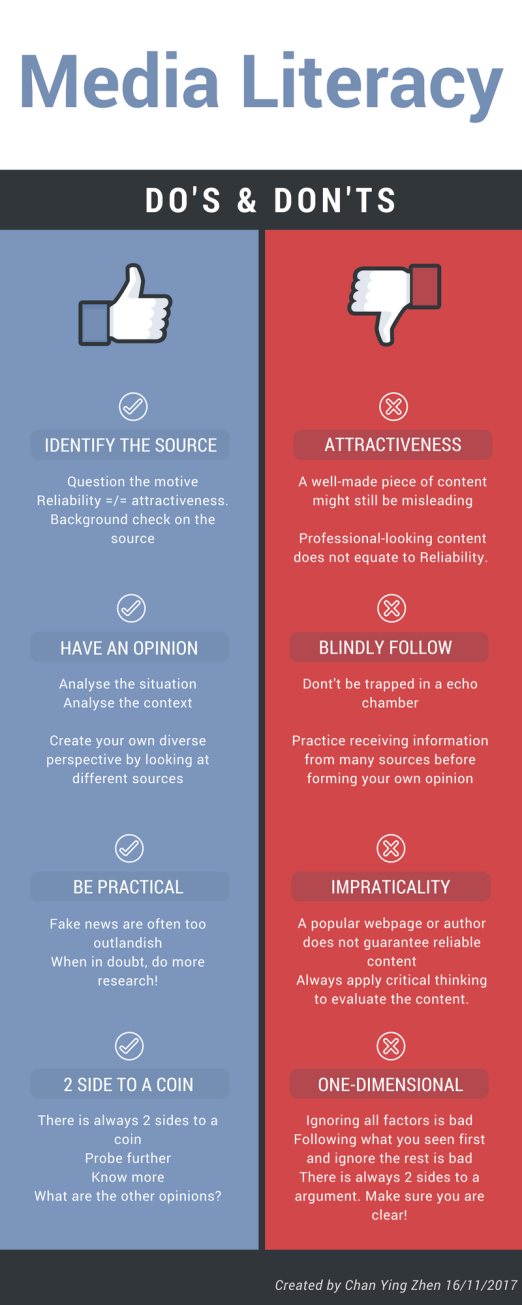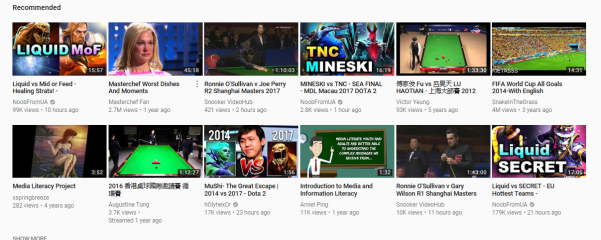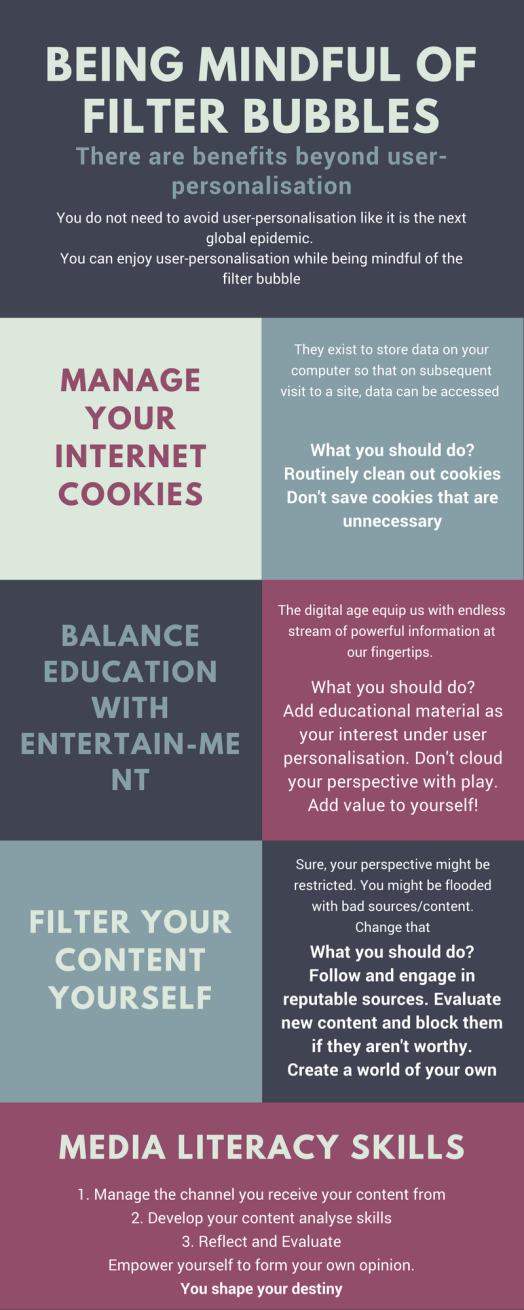
Sources: Original Content
Yes, the above comic might just become reality soon. Singapore Minister K Shanmugam announced this year that laws to regulate and tackle fake news will be introduced in 2018. In a poll of 1600 Singapore Residents, it is reported that 75% of respondents come across fake news occasionally with only half of the respondents confident of recognizing fake news. This shows the increased prevalence of fake news which further highlights the need for media literacy.
How do I appraise my information?
Building skills for appraising online information starts from understanding the concept of media literacy.
Source: Simone Wagner, YouTube
The above video illustrates what media literacy is all about.
Media literacy is not an effort to restrict media use, but to encourage mindful and critical media consumption. (Thoman and Jolls, 2005)
I have put together a list of Do’s and Don’ts to help users develop their Media Literacy skills.

Source: Original content
Be mindful of filter bubbles
Many websites uses complex algorithms to create content personalisation for your feed, providing you with a high-quality online experience.

Great, what amazing convenience! Source: Author’s YouTube Channel
Filter bubbles is when the user’s perspective is tunneled by content personalisation leading to an isolation from differing viewpoints.
Remember that I previously used the word — Mindful. Be mindful of filter bubbles but do not avoid them. Enjoy the convenience but practice diversity in the digital content you consume. There is no empirical evidence that warrants strong worries for filter bubbles. (Zuiderveen Borgesius, 2016)
Confused? Let this inforgraphic show you the way you can maximize the benefits from content personalisation without the risks involved.

Source: Original Content
What have we covered?
We looked at media literacy and understood the concept behind it. We also looked at ways to develop strong media literacy skills to help us consume digital content more effectively. Filter bubbles are heavily criticized by many but the best of users— those with strong media literacy skills— can manage their filters to reap long-term benefits.
Avoid playing to the Narrow Worldview
Empower yourself to form your Own Opinion
Shape your own destiny
(319 words)
Ying Zhen
References:
Channel News Asia. (2017, Jun 19). New laws on fake news to be introduced next year: Shanmugam. Retrieved from Channel News Asia: http://www.channelnewsasia.com/news/singapore/new-laws-on-fake-news-to-be-introduced-next-year-shanmugam-8958048
Farnamstreet Blog. (n.d.). How Filter Bubbles Distort Reality: Everything You Need to Know. Retrieved from Farnamstreet Blog: https://www.farnamstreetblog.com/2017/07/filter-bubbles/
Kevin J. Delaney. (2017, Feb 21). Filter bubbles are a serious problem with news, says Bill Gates. Retrieved from QUARTZ: https://qz.com/913114/bill-gates-says-filter-bubbles-are-a-serious-problem-with-news/
Thoman, E., & Jolls, T. (2005). Media literacy education: Lessons from the center for media literacy. In G. Schwartz & P. U. Brown (Eds.), Media literacy: Transforming curriculum and teaching (Vol. 104, 2005, pp. 180 -205). Malden, MA: National Society for the Study of Education
University of Southampton 2017. (2017, Nov 16). Media Literacy. Retrieved from FutureLearn: https://www.futurelearn.com/courses/learning-network-age/3/steps/263021
Wagner, S. (2016, Jun 29). Media Literacy Explained. Retrieved from Youtube: https://www.youtube.com/watch?v=AD9jhj6tM50
Zuiderveen Borgesius, F. &. (2016). Should we worry about filter bubbles? Should we worry about filter bubbles?, Volume 5, Issue 1.

Hi Ying Zhen.
I like how you brought up some statistics on the local scene. It is alarming to know that only half out of the 75% who came across fake news are able to recognise it.
While there may be ways to tackle these issues by educating people about media literacy and ways to spot fake news, do you think that it is possible for us to “go back in time” to make things right?
According to an article by the World Association of Newspapers and News Publishers (WAN-IFRA), it was talked about that perhaps print (traditional media) can save real news from fake news.
In the past, we only had to rely on television broadcast and newspapers from the same few news outlets, there was no such thing as fake news then. What if we removed all digital news outlets, would that help? What do you think?
(149 WORDS)
Reference:
WAN-IFRA (2017) Can Print Save Real News From ‘Fake’ News? [online] Available at: http://www.wan-ifra.org/articles/2017/10/11/can-print-save-real-news-from-fake-news [Accessed 16 NOV 2017]
LikeLike
Hi Siewmin,
Fair point that you bought across.
I think it is not a very practical solution to do a technological backwards shift.
This is because:
1. Advancement of mankind is through improving the world. Such a decision could only work in theory
2. Investment on delivering news online is huge. The top companies spent a 6 figure initial sum on webpage development. This excludes all maintenance and operating cost. (source: I work in a web development company)
3. It is undeniable that the print media is dying. This is because online media have bought upon significant benefits for consumers. The world’s market is regulated by demand and supply. So long that print media has lower demand than online media, it will never be possible for us to “go back in time”.
This article further highlight reasons why print media is a dying industry.
https://www.insidermonkey.com/blog/top-5-reasons-why-print-media-is-a-dying-industry-321173/
Cheers!
LikeLiked by 1 person
[…] Siew Min suggested removing all digital news outlets in a return to print media. In my reply, I highlighted 3 main points to refute the suggestion. In hindsight, I thought that a best of both world could be the ideal situation. In that, I am suggesting that a mix of print and digital media might be the best for newsroom. […]
LikeLike
[…] upon Ying Zhen’s blog post and Xin Yi’s blog post, both of them gives a very different perspective about the […]
LikeLike